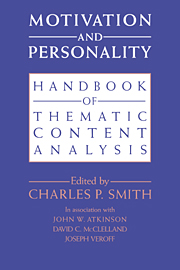Book contents
- Frontmatter
- Contents
- List of contributors
- Preface
- Acknowledgments
- 1 Introduction: inferences from verbal material
- PART I GENERAL ISSUES
- 2 Motivational determinants of thematic apperception
- 3 How do self-attributed and implicit motives differ?
- 4 Thematic analysis, experience sampling, and personal goals
- 5 Motivational configurations
- 6 Thematic apperceptive methods in survey research
- 7 Content analysis of archival materials, personal documents, and everyday verbal productions
- 8 Reliability issues
- PART II CONTENT ANALYSIS SYSTEMS
- PART III METHODOLOGY, SCORER TRAINING, DATA COLLECTION
- Appendix I Practice materials for learning the scoring systems
- Appendix II Pictures used to elicit thematic apperceptive stories
- Appendix III How to order additional practice materials
- References
- Name Index
- Subject Index
7 - Content analysis of archival materials, personal documents, and everyday verbal productions
Published online by Cambridge University Press: 16 October 2009
- Frontmatter
- Contents
- List of contributors
- Preface
- Acknowledgments
- 1 Introduction: inferences from verbal material
- PART I GENERAL ISSUES
- 2 Motivational determinants of thematic apperception
- 3 How do self-attributed and implicit motives differ?
- 4 Thematic analysis, experience sampling, and personal goals
- 5 Motivational configurations
- 6 Thematic apperceptive methods in survey research
- 7 Content analysis of archival materials, personal documents, and everyday verbal productions
- 8 Reliability issues
- PART II CONTENT ANALYSIS SYSTEMS
- PART III METHODOLOGY, SCORER TRAINING, DATA COLLECTION
- Appendix I Practice materials for learning the scoring systems
- Appendix II Pictures used to elicit thematic apperceptive stories
- Appendix III How to order additional practice materials
- References
- Name Index
- Subject Index
Summary
The scoring systems described in this book are usually applied to written thematic apperception materials obtained by the direct testing of groups or individuals. Veroff (chapter 6) has described how they can be adapted for use in survey research, which greatly expands their applicability. This chapter describes how they have been used to analyze archival historical materials, personal and cultural documents, and everyday verbal material such as conversations, reported dreams, and even transcriptions of television programs.
WHY USE HISTORICAL MATERIALS?
Problems of direct testing
Often we want to make psychological inferences about people and groups to whom we lack access, groups that cannot be studied by any kind of direct testing or survey interviewing. Prominent persons such as authors or political leaders usually cannot be tested; and when they can, ethical considerations would make it difficult to disclose the results. Large groups or cultures are too amorphous and too expensive to study by direct testing. And (to adapt a quotation from Glad, 1973) by their deaths, historical figures and groups have taken with them their achievement and power motivation, their integrative complexity and their explanatory style. There are also situations where testing, even with thematic apperception methods, is possible but undesirable because it arouses test-taking or self-presentation sets, suspiciousness, defensiveness, or anxiety (Lundy, 1988).
- Type
- Chapter
- Information
- Motivation and PersonalityHandbook of Thematic Content Analysis, pp. 110 - 125Publisher: Cambridge University PressPrint publication year: 1992
- 22
- Cited by



